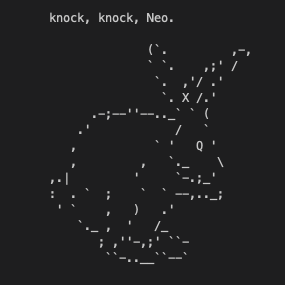

Run a pihole dns server on your network, I didn’t even realize they ran ads on the site. I just popped off wifi and on to cellular, and wow yeah it’s rough.
Cybersecurity professional with an interest in networking, and beginning to delve into binary exploitation and reverse engineering.


Run a pihole dns server on your network, I didn’t even realize they ran ads on the site. I just popped off wifi and on to cellular, and wow yeah it’s rough.
We’Re ALL sERIOUs cOrpoRaTE BusInEss pEOPlE HerE. NEW Rule, IF yoU’RE NOT postiNg whILe WeARiNg a suit aNd tie yOU shouldN’t be POstiNg.
Yeah I have no idea lol. Fwiw, I think the community (both this one particularly and Lemmy as a whole) is small enough that there’s no point in banning memes at this time. If the entire post history in this community just becomes memes though that would change pretty quickly.
I’m really trying to figure out how a single post constitutes spamming though.


Yup, it’s a compiled binary that is executed on the victim user’s system.
I edited the post to point to the actual report published by Trellis here. It’s a malware analysis report so it doesn’t go in to the methodology of the initial delivery but there is a little section at the beginning detailing some steps the malware developers took trying to trick users into thinking the “app” was buggy instead of malicious.


It would be cool to see companies start offering homelab licenses for people to play around with and get experience before buying into a whole ecosystem.
Like you said, I think companies should be prohibited from locking security updated behind a license paywall. Features are one thing, and while I would also like free homelab licenses, I understand why companies don’t offer them, especially for products like enterprise firewalls, routers, and switches. A company shouldn’t require you to pay more money to secure something they shipped with a vulnerability. Honestly this kind of shit should take precedence over the squabbling about USB-C, App Store monopolies, or whatever other flavor of the month issue the EU or the US is lambasting tech companies for.


Yeah, that’s not optimal. My single-sourced, non-verified quick Google search tells me that brute forcing a 10-char password of lower case letters only would be instant, subbing out one char for an upper-case letter would increase to one month, and subbing out another char for a number raises that to 6 years. Simply allowing for a special char would take 50 years.
That’s assuming the password is truly random. Use a dictionary with some rule sets, and make some assumptions like people will probably just append a number to the end of their password, and you’ll knock those times down drastically.
There’s no excuse for not allowing your users to use safe passwords.
It’s an amazing feeling, enjoy it. It’s a probably equally as awesome a feeling as when you see ads while on public wifi somewhere and realize that the no ad experience has been completely normalized for you again.